
Image Source: http://rackcdn.com
Perimeter is the distance around the outside of an object, but Area is the amount of space inside a two dimensional flat object.
In this post we look at the area of geometric shapes. However we do not look at Compound Areas or Circles, as these will be covered in other posts.
Areas are Important for Surveyors, Town Planners, and Councils.

Image Source: http://clcreport.files.wordpress.com
Aeronautical Engineers work out the areas of aircraft wings when investigating aerodynamic properties and designs.
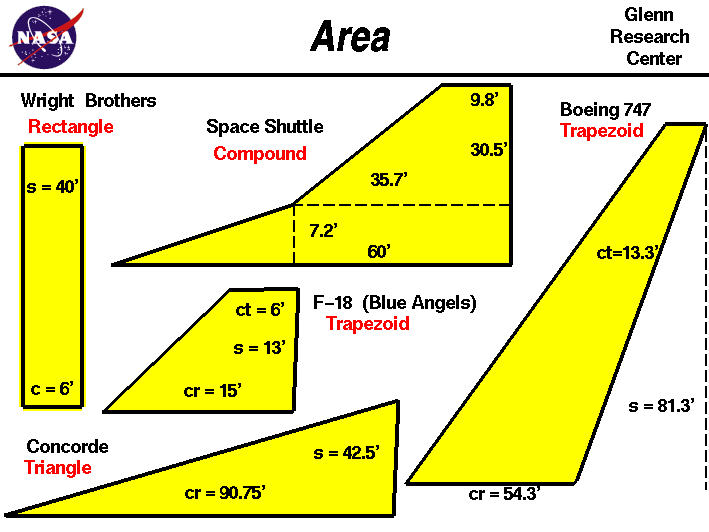
Image Source: http://www.grc.nasa.gov
Area is also very important for Builders, when quoting for costs of materials.
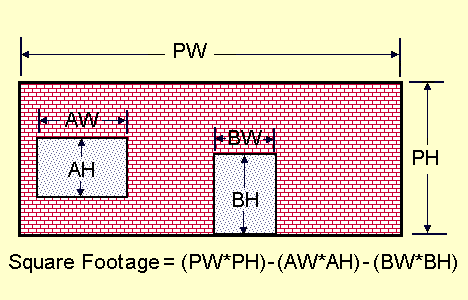
Image Source: http://www.ebricksolutions.com
People who work with lighting and media projectors need to understand the mathematics involved with the dispersion and intensity of light.

Image Source: http://www.sciencebuddies.org
Now that we know how important Area is to our everyday lives, let’s start looking at the Mathematics of calculating areas.
Here is a great music video to watch all about Perimeter and Area.
[youtube http://www.youtube.com/watch?v=D5jTP-q9TgI]
Different shapes have different area formulas.
Area of a Rectangle
A very simple shape is the “Rectangle”.
A Rectangle has an Area of Base x Height, which is sometimes called Length x Width, or Length x Height.
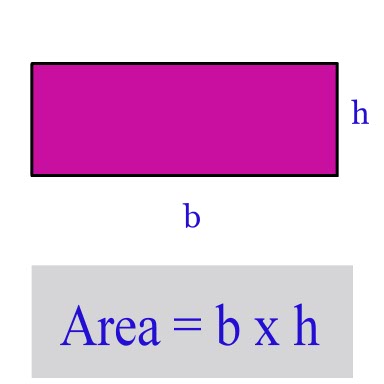
Image Source: http://www.k6-geometric-shapes.com
We can prove this formula by drawing a whole bunch of rectangles, and counting how many squares are inside them.
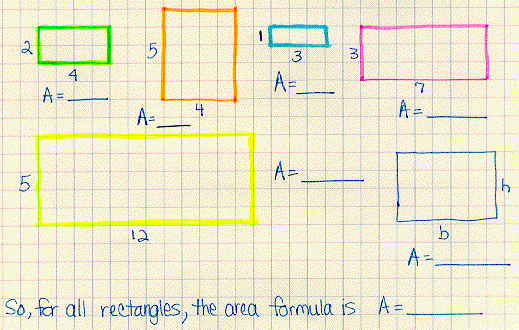
Image Source: http://www.geom.uiuc.edu
However, not all shapes are as simple as a Rectangle. If we push a Rectangle sideways, we from a Parallelogram.
Area of a Parallelogram
The Area of a Parallelogram is Area = base x height
Here is a video all about the Area of a Parallelogram.
[youtube http://www.youtube.com/watch?v=dLZd1MD9kaw]
How do you like this for a real life Parallelogram!

Image Source: http://www.elec-intro.com
Area of a Triangle
We could work out the area of a triangle by drawing it to scale on grid paper and counting squares.
Image Source: http://www.geom.uiuc.edu
But it is much easier to measure the triangle’s base and height, and use a mathematical formula to calculate the area.
This formula can be worked out very easily, because a Triangle is half of a Parallelogram.
Area of any Parallelogram is Area = base x height.
So the area of any Triangle is : Area = 1/2 x base x height.
Here is a video that explains how this works.
[youtube http://www.youtube.com/watch?v=2avSR3Izbss]
Here is an example of how we calculate the area of a triangle.
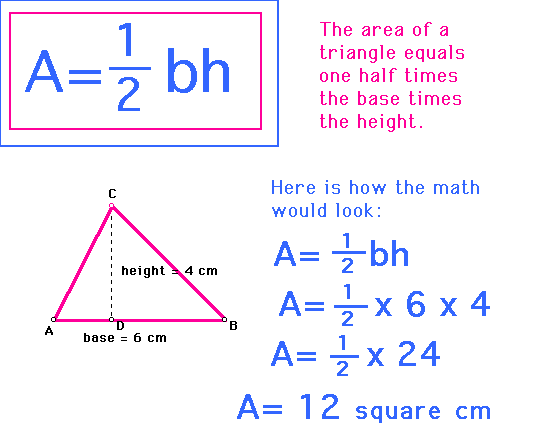
Image Source: http://www.loisterms.com
Note that the above example used “FISC” working out steps.
Formula
Information diagram
Substitution of values into Formula
Calculate the final answer and make sure it has square units on it. Eg. sq cm, sq inches, sq km, and so on.
It is vitally important to always show these steps when calculating the area of any shape.
Area of a Trapezium (or Trapezoid).
This shape is a bit like a Parallelogram, except that it only has two parallel sides.
Australians call it a “Trapezium”, and Americans call it a “Trapezoid”.
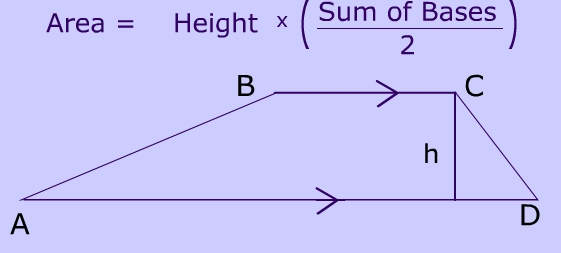
Image Source: http://www.mathwarehouse.com
Here is a quick little video to help remember how to calculate the area of a Trapezium.
[youtube http://www.youtube.com/watch?v=qlxawNewXiY]
Area of a Rhombus
A Rhombus is a Parallelogram that has all four sides equal. We can work out its area using Base x Height, but we can also work out the same area by multiplying the two internal diagonals together, and dividing by 2.

Image Source: http://www.thefreemathtutor.com
Answers to Rhombus Questions:
Q1. 418 sq cm, 41600 sq mm, 0.0006 sq m.
Q2. 91 sq cm
Q3. (1000×2) / 10 = 200mm.
Q4. (120×2) / 30 = 8m.
Area of a Kite
A Kite is a similar shape to a Rhombus, and its area is obtained by multiplying together its diagonals.

Image Source: http://www.coolmath.com
Summary of Area Formulas
Here is a set of formulas that are used in mathematics for finding areas.

Image Source: http://www.math-videos-online.com

Image Source: http://www.grc.nasa.gov
Online Activities
Here is an Online learning Activity to do that is all about Perimeter and Area
http://www.bgfl.org/bgfl/custom/resources_ftp/client_ftp/ks2/maths/perimeter_and_area/index.html
Here is an activity on Areas of Rectangles, Triangles, and Parallelograms.
(This one takes a little while to load up).
Click the question mark to enter your answer, then click the ok to check your answer.
http://www.bbc.co.uk/schools/ks3bitesize/maths/measures/area/activity.shtml
Online Area and Perimeter Games
Play this fun game where we use basic Area and Perimeter skills to design zoo enclosures for animal exhibits:
http://www.mrnussbaum.com/zoo/index.html
Play this interesting game to find the relationship between Perimeter and Area.
http://pbskids.org/cyberchase/games/perimeterarea/index.html
Have some fun learning about irregular shaped areas with this Tangrams game.
http://pbskids.org/cyberchase/games/area/index.html
A Challenging Area and Perimeter Game
It is necessary to get right on the corners of the initial symbols, get the hand symbol, and then drag the items around the grid to make them fit according to the Perimeter and Area rules given.
Note that final areas of items are not allowed to overlap. However, it might be necessary to do some overlapping while making the shapes.
http://www.mathplayground.com/PartyDesigner/PartyDesigner.html
Test Yourself Online
Click the link below for an Online Lesson on Area of Triangles, and scroll down the page to do a five question online test.
http://www.mathgoodies.com/lessons/vol1/area_triangle.html
Click the link below for an Online Lesson on Area of Parallelograms, and a five question online test.
http://www.mathgoodies.com/lessons/vol1/area_parallelogram.html
Click the link below for an Online Lesson on Area of Trapeziums, and a five question online test.
http://www.mathgoodies.com/lessons/vol1/area_trapezoid.html
Here is an Online Quiz on Areas of Rectangles and Parallelograms, that includes finding unknown sides, if Area is known.
http://au.ixl.com/math/year-7/area-of-rectangles-and-parallelograms
Try these mixed practice questions on Perimeter and Area.
http://www.mathgoodies.com/lessons/vol1/practice_unit1.html
Here is one final set of mixed problems.
http://www.bbc.co.uk/scotland/learning/bitesize/standard/maths_i/measure/quiz/area_general/
Hope this has covered all areas !
Related Items
Perimeter
Circumference
Area of a Circle
Interesting Circles
Composite Areas
Measurement Formulas
Tall Buildings and Huge Water Dam
My Virtual Home
If you enjoyed this post, why not get a free subscription to our website.
You can then receive notifications of new pages directly to your email address.
Just find the subscribe area on the right hand sidebar, fill in your email address and click the “Subscribe” button.
To find out exactly how free subscription works, click the following link:
Enjoy,
Passy









Pingback: Measurement Formulas 1 | Passy's World of Mathematics
Pingback: Composite Areas | Passy's World of Mathematics
Pingback: Area of a Circle | Passy's World of Mathematics
Pingback: Circumference | Passy's World of Mathematics
Pingback: Interesting Circles | Passy's World of Mathematics
Pingback: Perimeter | Passy's World of Mathematics
Pingback: My Virtual Home | Passy's World of Mathematics
Pingback: Measurement Formulas 1 | Passy's World of Mathematics
Pingback: Area of Simple Shapes | Passy's World of Mathematics
Pingback: Big Measurements | Passy's World of Mathematics
Pingback: Composite Areas | Passy's World of Mathematics
Pingback: Circumference | Passy's World of Mathematics